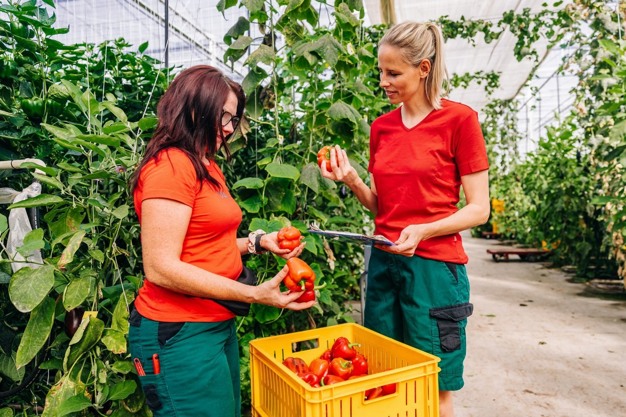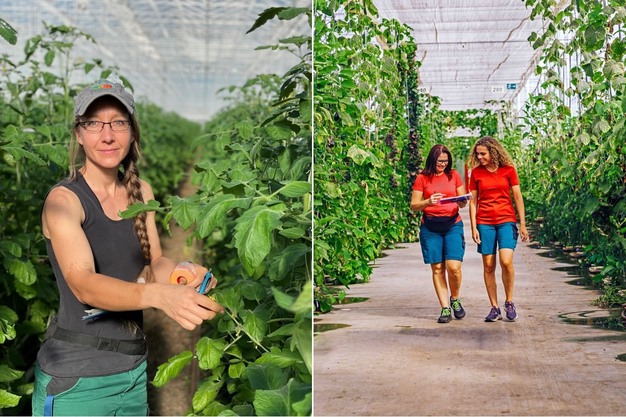The Westhof Bio Group looks back on a challenging cultivation year for tomatoes and bell peppers. Extreme weather conditions with unusually little sunlight, as well as increased energy and labor costs, put the vegetable farm to the test. Despite this difficult situation, the team managed to keep yields at a stable level thanks to state-of-the-art technology, forward-looking investments in renewable energies and meticulous crop management – without losing sight of the principles of organic farming.
"The lack of light in the crucial growth phase from planting to the beginning of summer was 40 to 50 percent below the average of the last ten years," explains plant manager Kathleen Schmidt. "Since the use of artificial light is not allowed in organic farming, the harvest season unfortunately started late this year, with a yield shortfall of around two kilograms per square meter compared to the previous year." Nevertheless, Schmidt is satisfied: "Good-tasting tomatoes and bell peppers need healthy soil, plenty of sun and moderate temperatures – and with the help of our high-tech greenhouses, we can at least partially compensate for weather-related fluctuations."

Innovative, climate-neutral heating
However, the reduced light conditions not only increased the risk of yield losses, but also the risk of infection from harmful fungi, as soft plant tissue becomes more susceptible. Chemical treatment is out of the question on the Bioland farm. Instead, the company relies on an innovative, climate-neutral heating system that is coordinated in real time with the outdoor climate and thus regulates humidity to keep fungal infections at bay. To do this, the Westhof Bio Group uses the waste heat from its own biogas plant, which is fueled by clover grass and non-marketable vegetables from its own cultivation.
There is also a great deal of economic pressure on domestic production. "Competition from southern Europe, particularly from Spain, has advantages due to low wages and minimal environmental regulations, which put us here in Germany under a lot of pressure," explains Schmidt. But she emphasizes: "What use is the supposedly low price for the consumer if water resources, nature and labor are exploited in Spain in order to offer cheap organic tomatoes here?" Westhof Bio Group customers appreciate the controlled quality and security of supply from the region. The proximity enables seamless traceability and ensures that the products come from the greenhouses of the family business from May to November.

Growing awareness of sustainably produced food
With this year's harvest season now over and the last tomato and bell pepper plants due to leave the greenhouse in the next few weeks, the Westhof Bio Group is looking to the future with optimism. "Despite all the crises, we can see that awareness of sustainably produced food is growing," says Kathleen Schmidt. "We are prepared to do our part to ensure that we can continue to offer healthy food produced in an environmentally friendly way in the future."
Photo credit: Westhof Bio-Gemüse GmbH & Co. KG
For more information:
Westhof Bio-Gemüse GmbH & Co. KG
To the Westhof 6
D-25764 Friedrichsgabekoog
T + 49 4839-95303-0
[email protected]
www.westhof-bio.de
